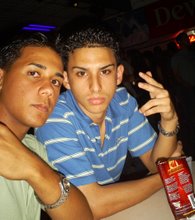This week we read two new stories, Eveline and Girl, the first written by James Joyce and the second by Jamaica Kincaid. Girl was a very strange story, because I never thought that a single sentence could be considered as a short story. It is a single sentence, a very extensive one. The whole story is about a mother who is speaking to her daughter telling her what she should do, how she should act and how to do everything. It is a story about how parents always are obligating you to do this, to do that, this is good and this is bad, you should do this and you shouldn’t do that. That’s funny because at least the half of what the mother told to her daughter we had heard that in a moment of our life. But what captured my attention was that the mother is very strict with her and is always telling her daughter that she has to do everything she said to not become a slut, as she expects her daughter to be.
In the story, the daughter spoke only two times because her mother was talking like a maniac. The most interesting part of the story is when the mother tells her daughter “this is how to squeeze a bread to make sure it’s fresh”. That’s erotic because she refers to the male sexual organ. The daughter later ask her “but what if the baker won’t let me feel the bread” and the mother answered “you meant to say that after all you are really going to be the kind of woman who the baker won’t let near the bread?”. I think the mother is trying to tell her daughter that she has to be sure that the man she choose is virgin and if she don’t do that, the consequence is that she would be treated as a slut. The story was interesting but I never thought that a single sentence could be considered a short story.
Monday, February 19, 2007
Sunday, February 11, 2007
Reflection # 3: "The Cask of Amontillado"
This week was an interesting one. We read two good stories but “The Cask of Amontillado” was more interesting to me. It was a crazy story of a man named Montresor who is planning to take revenge of his friend Fortunato. What did Fortunato to make Montresor angry and full of revenge? The author doesn’t give a clear explanation and description about what Fortunato did.
The way that Montresor planned the revenge was very crude. He planned it step by step. He knew that nobody will notice that because everybody was at the carnival and he knew that his friend Fortunato, the victim, was going to be drunk so Fortunato would not be able to notice Montresor’s perverse plan. Another interesting thing in this story was Montresor’s family symbol. Yeah, the foot crushing a serpent. That give us an idea of whom and how was his family. They all were sick peoples, sick of hate and revenge and Montresor inherited his family’s characteristic. And also the motto “No one wounds me with impunity” gives us a clue of the outcome of the story. Montresor started to make the wall to lock his friend and Fortunato though it was a joke. Of course if my friend tries to lock me in a crypt I would think it is a joke. After all Montresor locked Fortunato on a crypt and eventually he dies. It’s crazy to thing that a man is trying to do that to his friend. Montresor is a sick man. He is crazy and a very vindictive man. The story was very interesting and full of horror and suspense and I really liked it.
The way that Montresor planned the revenge was very crude. He planned it step by step. He knew that nobody will notice that because everybody was at the carnival and he knew that his friend Fortunato, the victim, was going to be drunk so Fortunato would not be able to notice Montresor’s perverse plan. Another interesting thing in this story was Montresor’s family symbol. Yeah, the foot crushing a serpent. That give us an idea of whom and how was his family. They all were sick peoples, sick of hate and revenge and Montresor inherited his family’s characteristic. And also the motto “No one wounds me with impunity” gives us a clue of the outcome of the story. Montresor started to make the wall to lock his friend and Fortunato though it was a joke. Of course if my friend tries to lock me in a crypt I would think it is a joke. After all Montresor locked Fortunato on a crypt and eventually he dies. It’s crazy to thing that a man is trying to do that to his friend. Montresor is a sick man. He is crazy and a very vindictive man. The story was very interesting and full of horror and suspense and I really liked it.
Sunday, February 4, 2007
Reflection #2 "The Grandmother Told You Not to Go that Way"
This was a horrifying, deadly, poisonous and disturber week. Starting with “A Rose for Emily” a short story about a woman who sleeps with a dead body and finishing with “A Good Man Is Hard to Find” another short story about a family who were killed by a group of three criminals. The most incredible about this is that a woman also named Emily, here in Puerto Rico, did the same as Emily in the story, slept with a dead body. Aaaaaaaaahhhhhhhhhhh!!!!! How crazy, maniac, and psycho one should be to sleep with a dead body. If that is incredible, what about killing a whole family, including the children. That was what happened in “A Good Man Is Hard to Find” and what I’m going to write about.
Everything started when the family planed to go to Florida. The grandmother adverted her son not to go to Florida because there were a murderer so she wanted to go to Tennessee but her son denied to, so all the routes pointed at Florida where The Misfit, the murderer, with his gang members were looking for their next victim, in this case victims. What capture me the attention is that, like most places, there’s a place to stay a couple of hours for entertainment and to take some food. I’m talking about The Tower, the Red Sammy’s restaurant. That’s biblical, that was like the last dinner they had before dying. Of course that nobody, except God, know when where or how you will die, but what I want to show you is that looked like the last dinner.
The funniest thing of this is that the grandmother though they were going to Tennessee, so she told the family about a house with a secret panel causing the children to get interested in it. I think she had Alzheimer or something like that to not to recognize the area and that was critical and probably what moved them to a tragic future. They were the people with the worth lucky in the world to have an accident in the worth place in the worth moment. And this man, The Misfit, with his sick mind and with the help of his gang members kills them crudely and with no reason.
The question is why he kills them? What did the family to push him to do that? The father, the mother and the children, he killed them all. The most impacting moment of the story is when the grandmother tries to persuade him to not to kill her, but to start praying and to believe in God. This was an interesting part because, in a difficult moment like that, the grandmother was telling to The Misfit that God is the right way and that he should start to pray when, in a certain form, she was also loosing her faith. What leaved me with some doubts was that, after The Misfit killed the grandmother, Bobby Lee said “Some fun!” and The Misfit said to him “Shut up, Bobby Lee. It’s no real pleasure in life.” Did he suddenly felt sorry of what he did?
Everything started when the family planed to go to Florida. The grandmother adverted her son not to go to Florida because there were a murderer so she wanted to go to Tennessee but her son denied to, so all the routes pointed at Florida where The Misfit, the murderer, with his gang members were looking for their next victim, in this case victims. What capture me the attention is that, like most places, there’s a place to stay a couple of hours for entertainment and to take some food. I’m talking about The Tower, the Red Sammy’s restaurant. That’s biblical, that was like the last dinner they had before dying. Of course that nobody, except God, know when where or how you will die, but what I want to show you is that looked like the last dinner.
The funniest thing of this is that the grandmother though they were going to Tennessee, so she told the family about a house with a secret panel causing the children to get interested in it. I think she had Alzheimer or something like that to not to recognize the area and that was critical and probably what moved them to a tragic future. They were the people with the worth lucky in the world to have an accident in the worth place in the worth moment. And this man, The Misfit, with his sick mind and with the help of his gang members kills them crudely and with no reason.
The question is why he kills them? What did the family to push him to do that? The father, the mother and the children, he killed them all. The most impacting moment of the story is when the grandmother tries to persuade him to not to kill her, but to start praying and to believe in God. This was an interesting part because, in a difficult moment like that, the grandmother was telling to The Misfit that God is the right way and that he should start to pray when, in a certain form, she was also loosing her faith. What leaved me with some doubts was that, after The Misfit killed the grandmother, Bobby Lee said “Some fun!” and The Misfit said to him “Shut up, Bobby Lee. It’s no real pleasure in life.” Did he suddenly felt sorry of what he did?
Subscribe to:
Posts (Atom)




